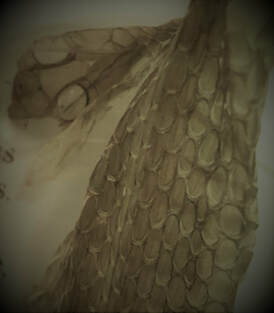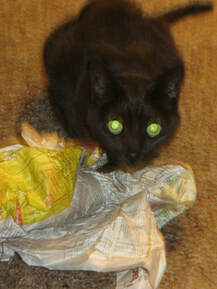
We started with basic writing guidelines and a heavy dose of encouragement from Wagner. She’d placed objects on a table off to the side, and invited each person to choose one, study it, note how it spoke to us, then write a poem. As I finished taking notes, others jumped up to peruse the objects on the table. Head down, I heard a yelp followed by several shudders of agreement as someone said, “I hate snakes.”
Waiting until the others had chosen objects, I walked over and picked up what had caused the fuss: fragments of a snakeskin. Fragile, smooth, transparent. Scales like windows, weaving, ladder rungs, railroad ties. Growth, movement, a vague memory of what had been living and breathing inside. Immersed in the exploration process, I did not even start a poem. Intrigued by the question, “Why did I choose the snakeskin?” my pen created a web of thoughts not yet ready to be corralled into a poem.
Listening politely as others read their poems, my thoughts still circled around the question. Driving home, I eventually pulled over to write down not an answer, but another question—the first line of a poem:
Why do I so often reach for what makes others recoil?
The stanzas that followed over the next couple of weeks felt forced and clunky but they helped me work through that question a bit. The “finished” poem ended with:
So I lift instead the wispy snakeskin sensing a kindred spirit.
A few days ago as I wrestled with what lies ahead for me in 2019 and beyond in my devotional journal, the first line of the poem came back to me. I unearthed the poem and my workshop notes from a case of old writing hoping for an answer or at least a direction. Instead I simply found fragments of thoughts. But that’s okay—I enjoy the process as much as the final product. The journey as much as the destination.
1 Peter 1:17-21 The Message

 RSS Feed
RSS Feed